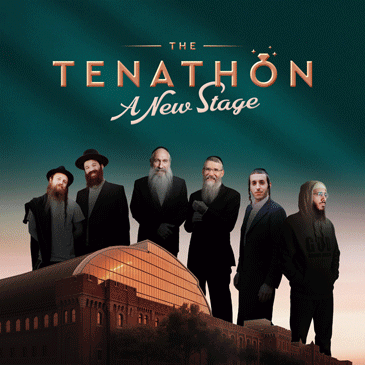
Op-Ed: Unity Within Comm-unity
Three Modest Thoughts on the Latest Communal and Global Developments
Winds of uncertainty are blowing across the globe. A tsunami in Japan, renewed terrorist attacks in Israel, a middle-east – from Egypt to Libya, Syria to Yemen – in crisis. And the future remains unsure. Will the sun shine again? Will stability re-emerge after the storm dies down?
Jewish communities worldwide are also suffering their own turbulent storms. Institutions are closing, organizations are shrinking, and associations are ‘cutting back’. And as some grapple to find answers to the many unanswered questions, the curse of division threatens to pervade our circles of joy. The age-old axiom of “two Jews, three opinions,” at times describes well some reactions and messages from many distressed leaders and community members. Yet, such behavior rings its own bell of disharmony. It is akin to a husband complaining about his wife publicly, instead of waiting for the appropriate forum and the proper setting. To paraphrase Jonathan Swift, the Anglo-Irish, 18th Century satirist; “we have just enough religion to make us hate one another, but not enough to make us love one another.”
So how should we proceed? What can we do, individually and communally? How can we fruitfully direct our efforts and direct our community down paths toward a better, stronger and healthier future? Here are three modest thoughts:
Step 1: Don’t Be Alone
A decade ago, researchers in this country asked a large group of people who they would turn to if they needed help. The results were astounding: while a small percentage said they would turn to a government agency, eighty six percent revealed that they would turn to a member of their congregation. Perhaps, this is but an expression of our intrinsic interdependence. Human beings yearn for one another; we need each other. It is no coincidence that in the entire book of Genesis only one thing is called “Lo tov” – not good; “it is not good for man to be alone” .
As a Rabbi, one of my deepest pleasures stem from a silent observation I enjoy making every week. As in many communities, our congregation Beth Tefillah in Scottsdale, Arizona, is abuzz with activity on the holy day of Shabbat. Chants of Mazal tov are sung for babies recently born and couples just married. Warm wishes are offered to our fellow congregants in need of healing, and words of comfort are bestowed upon the mourners. It is particularly these moments of life and love that fill me with true ‘nachat’ and satisfaction. For they stand as a reminder, that ultimately, it is this unbreakable sense of community that empowers us all, and uplifts us to a place where no challenge is too big, no obstacle is too tall.
Hence, our first step toward a better future must be a collective rededication to one another. Lend an attentive ear, extend a helping hand, reach out with a genuine smile. We must be there for each other. Not because of a relationship of power or honor. Not for self-serving reasons or purposes. But simply because it is indeed “not good for man to be alone.”
Step 2: Maintain a Sense of Proportion
My dear mentor, Rabbi Adin Steinsaltz once shared with me, that the difference between a wise man and a fool, is that a wise man “makes the important issues of life – important, and the trivial issues – trivial.” Conversely, a fool, “makes the important issues – trivial, and the trivial issues – important.” This summarizes best the vital approach we must undertake. True – we differ in many ways, and our perspectives are at times sharply opposing. But, in the end, we must make our common “important issues” – important, and let the trivial ones find their proper place.
After all, what unites us along with the vast majority of Jews is so much greater than what divides us. We all desire to ‘make this world a better place’. We all strive to become true ‘lights onto the nations’ . We all endeavor to nurture our children and surroundings with the infinite teachings of our Torah, and the divine traditions of our heritage. We all care deeply about our communities, and we all wish to actualize their endless potential and harness their dynamic force. But we can only do so if we learn to maintain a sense of proportion between the important issues and the trivial ones, and direct our focus on the former only. And if we have visions and plans of actions for the benefit of our communities, we must work together with our communities and decide to make them important and worthy of attention. This will build bridges, not walls; love, not apathy; harmony, not dissonance.
Step 3: We Are What We Do
Lastly, we must remember that Judaism has forever believed that more than “we are what we eat” and “we are what we love”, we are what we do. The more we engage in actions of goodness and kindness, the more we become good and kind. In the words of the legendary “Sefer Hachinuch – book of education”, which was published anonymously in Spain in the 13th Century: “Why did G-d bind us with so many commandments? Know that man becomes who he is, based on his actions. The heart always follows deed, whether for good or evil. Even a wicked person, who decides to perform good actions, will transform into a righteous individual.”
It is no secret that so much more can be accomplished with silent actions, small or big, than with loud words. If we each take upon ourselves to act more and say less, one mitzvah at a time, one good deed at a time, one soul at a time, our community will then undoubtedly become the model of goodness it so strives to be.
A New Way, Together
A man was once lost in a forest for several days. Finally, he saw another man approaching him. “Please show me the way out of the forest!” he called out to him. “Brother, I too am lost,” he replied. “But I can tell you this: the way I have come from leads nowhere; it has only led me astray. Let us join hands and search for a new way together.”
It is high time we join hands together in the sometimes overgrown forests of confusion. And although we each have unique perspectives and ways of conduct, we ought not walk alone. For like the colors of a rainbow or a symphony of instruments, true beauty will only emanate from cohesive diversity, and clarity will only stem from a consensus of distinct minds and ideas.
Unity, within the comm-unity, means to search for a new way together. Oftentimes, it is the best way; other times, it is the only way.

















masterpiece
Another masterpiece by Rabbi Allouche. Thank you for the clarity and wisdom!
well said
Very true and very relevant, thank you for your inspiring words
thoughtful
wonderfully thought out and written
chaim again
Community not Cammunity (see graffiti graphic)
Wow!
Very well written! It is so applicable for us all. Beautiful job, Rabbi Allouche